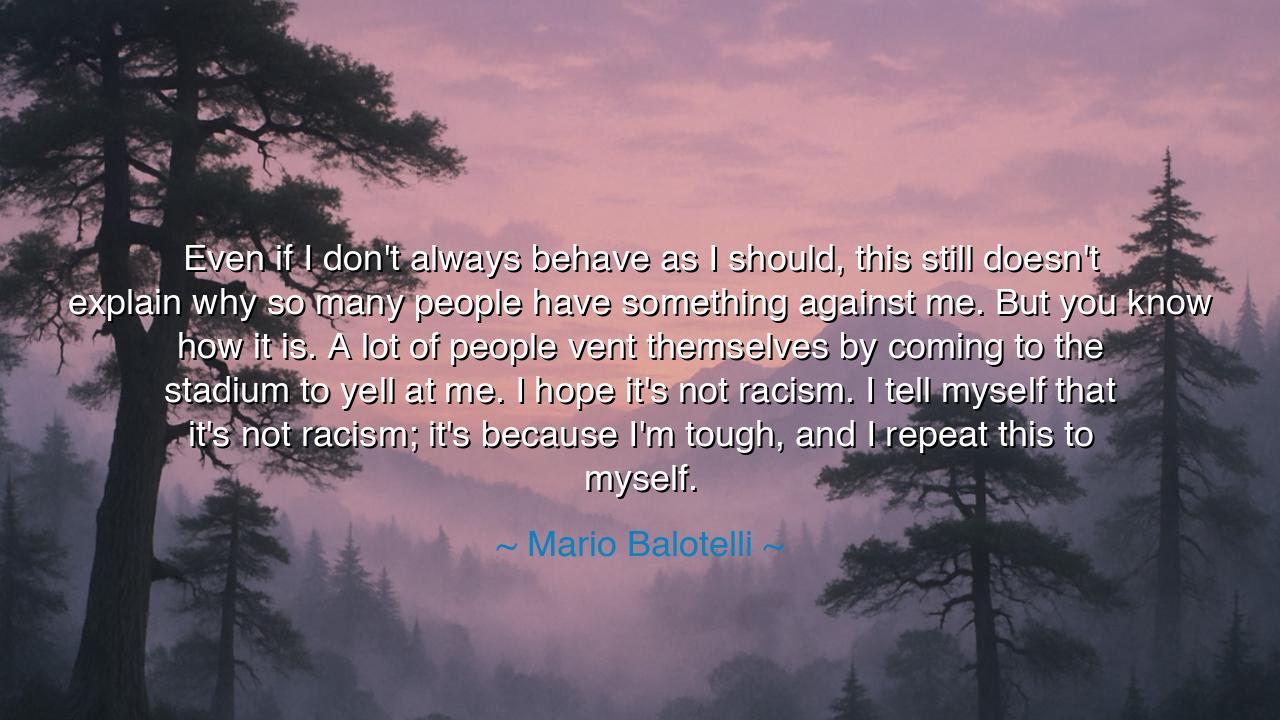
Even if I don't always behave as I should, this still doesn't
Even if I don't always behave as I should, this still doesn't explain why so many people have something against me. But you know how it is. A lot of people vent themselves by coming to the stadium to yell at me. I hope it's not racism. I tell myself that it's not racism; it's because I'm tough, and I repeat this to myself.






The words of Mario Balotelli, both vulnerable and defiant, echo the lament of one who has walked through fire and learned to hide his burns with pride: “Even if I don't always behave as I should, this still doesn't explain why so many people have something against me. But you know how it is. A lot of people vent themselves by coming to the stadium to yell at me. I hope it's not racism. I tell myself that it's not racism; it's because I'm tough, and I repeat this to myself.” In this confession, we hear the voice of a man both wounded and unbroken, a soul wrestling between pain and pride, between the cruelty of others and the need to preserve his dignity.
Mario Balotelli, an Italian footballer of immense talent and fierce spirit, has long stood as both hero and target. Born in Italy to Ghanaian parents, raised in a land that often questioned whether he truly belonged, Balotelli’s story is one of triumph shadowed by prejudice. The origin of this quote lies in his years of facing abuse from fans—mocked, jeered, and even subjected to racist chants in stadiums where he was meant to shine. His words are not merely about sport; they are about the universal struggle of the outsider, the one who gives his all yet remains misunderstood. In every era, there have been such figures—those whose greatness provokes admiration, but whose difference provokes cruelty.
When Balotelli says, “I hope it’s not racism,” he reveals the tender hope of one who wishes to believe in humanity even after being scarred by it. He does not deny his imperfections; he admits that he does not always “behave as he should.” Yet he recognizes that his flaws cannot justify the hatred he receives. This tension—between personal accountability and social injustice—is the heart of his lament. His repetition of “I tell myself that it’s because I’m tough” is both a shield and a prayer. It is the act of a man trying to protect his spirit from the poison of hatred. For to admit that the hatred is racism would be to face a pain too deep, a wound that might never close.
There is something profoundly ancient in this struggle. The Stoic philosophers spoke of the fortitude of the soul—the idea that one must not allow the malice of others to corrupt the inner self. Epictetus, once a slave, taught that while we cannot control what others do, we can control how we interpret it. Balotelli’s repetition of his mantra—“It’s because I’m tough”—is a modern echo of that Stoic wisdom. He turns his suffering into strength, his insult into identity. Yet behind that armor lies a truth the ancients also knew: that the brave heart still bleeds. The one who stands tall must still bear the weight of loneliness.
History is filled with such figures. Think of Jackie Robinson, the first Black man to break the color barrier in Major League Baseball. Like Balotelli, he endured jeers, insults, and threats simply for daring to exist in spaces that had long been closed to men of his color. Robinson, too, had to find ways to endure. He wrote that “the most luxurious possession, the richest treasure anybody has, is their personal dignity.” That same dignity—fiercely guarded, painfully earned—is what Balotelli speaks of. Both men remind us that dignity is not given by the crowd; it is forged in the soul, tested by hate, and kept alive by self-respect.
Balotelli’s words also unveil a deeper truth about society: that people often vent their frustrations upon those who stand in the light. The crowd, restless and unseen, seeks release, and so it finds a target—a scapegoat to bear its own dissatisfaction. This is an ancient ritual in human nature. In times of fear or anger, societies have always chosen someone to blame—the prophet, the outsider, the different one. Yet the wise know that such hatred reveals not the weakness of the target, but the sickness of those who hate. The jeers of the crowd are the echoes of their own emptiness.
Lesson and Practice:
When the world mocks you, when it seeks to tear down what it does not understand, remember the lesson of Mario Balotelli: your worth is not measured by the voices of the crowd. You must become your own source of hope. Tell yourself, again and again, that you are strong, not because the world believes it, but because you choose to believe it. And when cruelty tempts you to despair, remember that hatred dies in the hearts of those who rise above it. Be as the ancients taught—firm, patient, and noble in spirit. For the world may misunderstand you, but in enduring with grace, you become not only a survivor, but a symbol—a living proof that dignity, once chosen, cannot be taken away.






AAdministratorAdministrator
Welcome, honored guests. Please leave a comment, we will respond soon